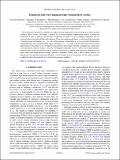Degenerate four-wave mixing in triply resonant Kerr cavities
Author(s)
Ramirez, David M.; Rodriguez, Alejandro W.; Hashemi, Hila; Joannopoulos, John D.; Soljacic, Marin; Johnson, Steven G.; ... Show more Show less
DownloadRamirez-2011-Degenerate four-wave.pdf (786.7Kb)
PUBLISHER_POLICY
Publisher Policy
Article is made available in accordance with the publisher's policy and may be subject to US copyright law. Please refer to the publisher's site for terms of use.
Terms of use
Metadata
Show full item recordAbstract
We demonstrate theoretical conditions for highly efficient degenerate four-wave mixing in triply resonant nonlinear (Kerr) cavities. We employ a general and accurate temporal coupled-mode analysis in which the interaction of light in arbitrary microcavities is expressed in terms of a set of coupling coefficients that we rigorously derive from the full Maxwell equations. Using the coupled-mode theory, we show that light consisting of an input signal of frequency ω0-Δω can, in the presence of pump light at ω0, be converted with quantum-limited efficiency into an output shifted signal of frequency ω0+Δω, and we derive expressions for the critical input powers at which this occurs. We find the critical powers in the order of 10 mW, assuming very conservative cavity parameters (modal volumes ~10 cubic wavelengths and quality factors ~1000). The standard Manley-Rowe efficiency limits are obtained from the solution of the classical coupled-mode equations, although we also derive them from simple photon-counting “quantum” arguments. Finally, using a linear stability analysis, we demonstrate that maximal conversion efficiency can be retained even in the presence of self- and cross-phase modulation effects that generally act to disrupt the resonance condition.
Date issued
2011-03Department
Massachusetts Institute of Technology. Department of Mathematics; Massachusetts Institute of Technology. Department of PhysicsJournal
Physical Review A
Publisher
American Physical Society
Citation
Ramirez, David et al. “Degenerate Four-wave Mixing in Triply Resonant Kerr Cavities.” Physical Review A 83.3 (2011) : 033834. ©2011 American Physical Society
Version: Final published version
ISSN
1050-2947
1094-1622